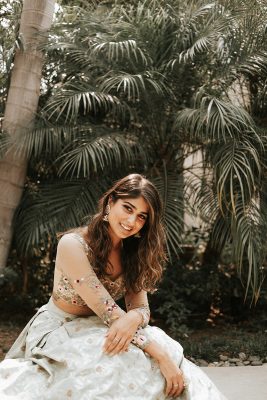Aisha Rawji graduated from Boston University in 2014 and went to work in advertising in New York City. But her real-life calling was fashion, so she created her own Indian fashion brand.

Kynah is a bridal store and e-commerce company founded in 2017 by Rawji. The website states their vision is to “redefine the way women customize, shop and wear Indian attire.”
Rawji, founder and chief executive officer of Kynah, said it began as a guest-wear company — clothes for guests at weddings — due to a lack of access to Indian clothes that were “well-designed” in the United States.
“Indian culture is so beautiful and I don’t think it gets enough attention in the West,” Rawji said. “I’ve used Kynah also as a platform to get recognition for our culture.”
Inclusivity is a huge goal of Kynah. Rawji wants to ensure that her company makes all women feel accepted, great and proud of their culture when wearing Kynah’s clothes. She also emphasized inclusivity in response to the generally less accepting nature of South Asian culture, with the presence of caste systems, colorism and body image amongst many other issues.
“When your culture rejects you and rejects who you are, you feel a disdain toward that,” said Rawji. “What I’m trying to do is build this connection and take us into the next century.”
Rajwi said that launching Kynah has been “a really great way” to connect with her own culture.
“When the pandemic hit I actually almost shut down my company,” said Rajwi.
This led her to start bridal consultation, eventually leading to a whole shift for the company to focus on bridal wear as well as guest wear since no one could travel to India during the pandemic.
Rajwi said South Asians have a “very antiquated” way of shopping for their fashion that involves traveling to India just to shop for these clothes.
Alysha Kassam Mukhida, 29, purchased her nikkah, reception and mehndi outfits from Kynah for her wedding.
“My favorite thing has to be that it’s easy and a one-stop-shop,” Mukhida wrote in an email.
Kynah constantly rolls out new products, making it easier to find what Mukhida needs. For example, when she had to find an outfit urgently for a bridal party, she “literally found something that matched exactly within thirty minutes.”
Rawji also found that Kynah could provide an innovative solution to it by making South Asian fashion more accessible not only through their own designs but also curating designs of top designers around India like Payal Singhal and Seema Gujral.
Minoti Benegal, e-commerce and marketing coordinator of Kynah, mentioned that although the bridal focus of the company is amazing, she would love to see guest-wear become more expansive and affordable.
“Hopefully moving forward, we can really embrace the whole wedding ceremony,” Benegal said.
Aside from improving accessibility to Indian fashion, Rawji said she wants to expose more of her culture to the West. One way this has already happened is through Hollywood.
“We worked with someone who was actually going to the Emmys as Regé-Jean Page’s date, from ‘Bridgerton,’ and she actually wore a traditional lehenga so it was really cool to see that on the red carpet,” Rawji said.
Richa Moorjani from the Netflix show “Never Have I Ever” has also worn products from Kynah.
Fashion had always been an interest for Rajwi, but her parents insisted that she attend a four year school like BU instead. Regardless, her passion for fashion still remained strong throughout the years.
Though Rawji did not regret her time at BU, she was still persistent in becoming part of the fashion world. “It’s something I’ve always wanted to do,” said Rawji.
While she does have some input in the designs of her brand, she decides to give creative liberty to her artisans who have decades of experience in the industry.
“You almost want to trust them in their expertise over your own,” said Rawji. “Learning from them is actually really amazing as well because that’s what they do day in and day out.”
Kynah is currently planning to open its first in-person store in Santa Monica and an office expansion in India. However, Rawji has an even bigger global vision for the brand.
She imagines reaching an international audience, “I would love to open a store in London or in Australia, wherever our customers are.”
Furthermore, she also hopes that Kynah will not only work with Indian artisans, but with artists from all around the world, like Africa.
Rawji hopes that a global market can create “an appreciation for the artsmanship that comes out of each of these countries.”














